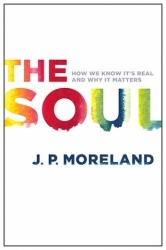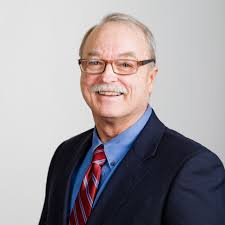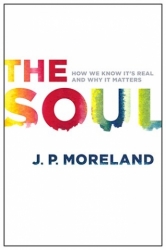J.P. Moreland’s The Soul: How We Know It’s Real and Why It Matters is not your usual study in biblical anthropology. But especially in today’s discussions with evolutionists and the New Atheists, for example, the subject of that “immaterial part of man,” as it is so often referred to, has become a subject in need of clear thinking. And, as the title implies, this is what the well-known philosopher-theologian from Talbot School of Theology has set out to provide for us. Today Dr. Moreland talks with us about his book and his complex subject.
Books At a Glance (Fred Zaspel):
Let’s begin with basics: Just what is the human soul?
 Moreland:
Moreland:
A soul is an immaterial substance or thing that contains consciousness and animates/enlivens the body. A body without a soul is a corpse, not a body.
Books At a Glance:
Belief that humans have a soul is virtually universal. How is this belief important? That’s a huge question, of course, but can you just sketch out for us some implications of believing – or not believing – in the soul?
Moreland:
If I am a soul with a body, then evolution cannot explain how I came to be. Why? Evolution is a totally physical story in which physical processes (mutation and natural selection) operate on purely physical materials (an arrangement of atoms called an organism) to produce a differently arranged set of atoms (a new organism). So another creation story must be correct. If, in the beginning were the particles, then no soul; only materialism. But if, in the beginning was the Logos, you start with mind/soul and there is no problem where other finite souls come from.
Second, I can’t have free will or moral responsibility unless I am a soul; if I am just a brain and body, everything I do is determined by my genes, brain structure and environmental inputs.
Third, no soul, no life after death.
Fourth, no soul, then very little value for a human being. The body is valuable, but not because it is material. It is valuable because it is ensouled, it has non-physical aesthetic qualities and so on. A corpse has very little value.
Books At a Glance:
You mention that there are important ethical ramifications entailed in a belief or disbelief in the human soul. What are they?
Moreland:
See above. Matter as some value but it is pretty low. Value comes most to organisms with consciousness and souls (animals, though their souls are not made in God’s image, humans). Also, value comes from immaterial secondary qualities (color, taste, sound, smell, texture), and non-physical aesthetic qualities (no physical property is normative or intrinsically valuable, but aesthetic qualities are both, so aesthetic qualities are not physical).
Books At a Glance:
It is sometimes argued today that neuroscience has disproven the existence of the soul, or at least has rendered the belief in it obsolete. Explain for us, if you will, the alleged basis of this claim and how in your view the claim is fundamentally mistaken, an over-stating of the evidence. Can you summarize this for us briefly?
Moreland:
Neuroscience cannot even formulate the foundational issues about what consciousness and the soul are, and whether or not they are real, much less provide answers to those questions. All neuroscience can do is place an image monitor on the brain, and see brain activity or the lack thereof in certain regions of the brain, and then as the person what conscious experience they were or were not having. All neuroscience can do is establish correlations between consciousness and brain states or dependency relations between the two (my memory doesn’t work well if a certain region of my brain is damaged: via neuroplasticity, I can re-grove my neuron patterns that cause anxiety or depression by forming new habits of thought and self talk. Neuroscience can say nothing either way about what consciousness is or whether or not there is a soul. It can only establish correlations and dependencies. The issues of the soul and consciousness are philosophical and theological, not scientific.
Books At a Glance:
Can you explain your point that human consciousness cannot be explained or accounted for on purely materialistic grounds? How does human consciousness point to something beyond the mere functions of the brain?
Moreland:
If you start with matter, say, at the Big Bang, and the history of the universe is the unfolding of physical events and re-arrangements of matter according to physical law, they you will end up with a purely physical universe that has various arrangements of particles from planets to organisms. You can’t get something (mind) from nothing (brute matter with no potential to generate consciousness). If your worldview starts with a Conscious Being, then consciousness is there from the beginning and when it shows up in the history of the cosmos in various places, you aren’t getting something from nothing.
Books At a Glance:
While we’re at it, what are some important necessary entailments of “physicalism” or explaining the mind or soul in mere materialistic terms?
Moreland:
Strict physicalism does not explain the mind/soul in materialistic terms. Strict physicalism reduces mind/soul to matter and says we are simply physical objects. If so, no life after death, no free will, no center of consciousness, one cannot remain the same through time since the body is constantly gaining and losing parts and, so, changes its identity thru time (since I am a soul and a soul is not built up out of parts, I can remain the same even if my body doesn’t).
Books At a Glance:
So the soul is more than just the brain, but obviously there is interaction between the two. What can we know about the relation of the soul to the brain?
Moreland:
I can interact with matter and raise my arm just like God (a pure Spirit) could interact and part the Red Sea. Why should anyone believe that just because two things are different, they cannot do things to each other. We all know better.

